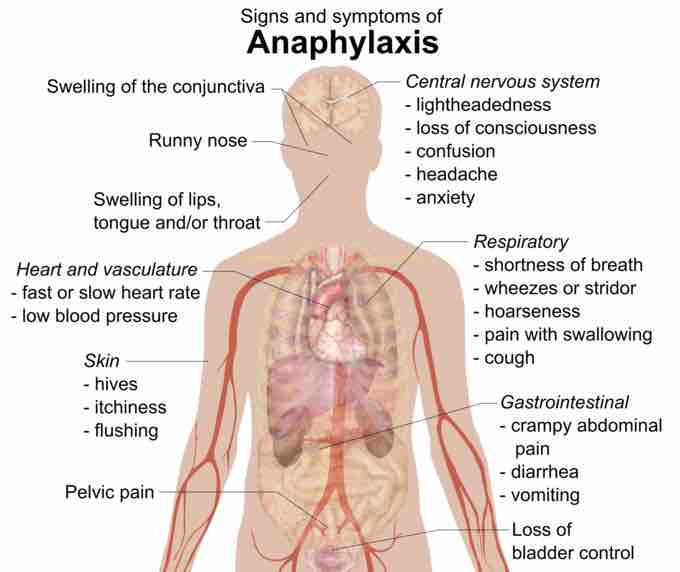Virtually any substance, when exposed internally or externally to the body, can act as an allergen and illicit an immune system response, such is the case with antimicrobial drugs. While the drug acts as an allergen, the drug itself is not causing direct damage to the individual, but rather it is the response of an individual's immune system which is deleterious. An allergic reaction is the body's response to clear a foreign substance. Once the body recognizes a substance as foreign (in this case an antimicrobial drug), it starts producing antibodies, specifically immunoglobulin E (IgE) against the drug. The IgE binds directly to the drug and sets off a cascade of events, including the activation of receptors on immune system cells. This results in the production of histamines. The worst allergic reactions can be very severe and result in anaphylaxis . Anaphylaxis is an extremely severe allergic reaction caused when histamines are overproduced leading to severe contraction of bronchial muscles. In the most extreme cases, the airways close, which can lead to death. Other less severe symptoms of an allergic reaction can include, hives, angioedema (tissue swelling under the skin, often on the face), tight throat, coughing, wheezing, or watery eyes.

sp3 hybridization
In the process of sp3 hybridization in methane, the single 2s and three 2p orbitals of carbon mix into four sp3 hybrid orbitals, which are chemically and geometrically identical. Bond angles are 109.5°.
The exposure to a drug may not elicit an allergic reaction during the first exposure, but after the first exposure, the body creates antibodies and memory lymphocyte cells against the drug, therefore later exposures to the drug will illicit an immune response. There are many factors that can determine if an individual is sensitive to an antimicrobial drug, as with other allergens. Some factors include genetics and past exposures to other allergens, typically a person who has allergies to other things, such as various foods, is more prone to have or develop drug allergies. The most reported drug allergy is to Beta-lactam antibiotics, of which penicillin is the most well-known type, affecting 1-5% of people who take penicillin. While the most severe cases can result in anaphylaxis, most reactions are not severe. Additionally the allergic reaction may not even be due to the penicillin, as dyes and other chemicals added to antimicrobial drugs may in fact cause the allergic response instead. Taken together, recent studies show that perhaps only 1/5 people who suspect they have an allergy to penicillin do indeed have such an allergy.

Anaphylaxis
A representation of the signs and symptoms of anaphylaxis that result from an allergic reaction. Signs include CNS symptoms such as confusion or lightheadedness, respiratory symptoms such as shortness of breath, gastrointestinal issues such as pain or vomiting, skin issues such as hives or itchiness, vascular symptoms such as change in heart rate or low blood pressure, and swelling of the mouth or eyes.